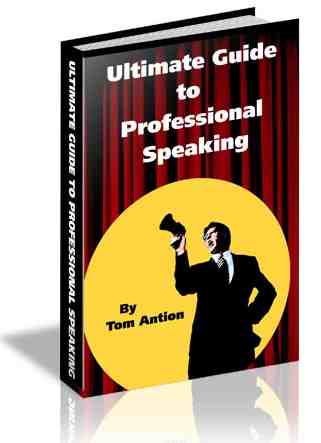 How to Close a Speech One of the worst mistakes you can make as a public speaker is talking
too long, that is known as a cardinal rule of dynamic public speaking skills. Not only will you send some folks to never, never land, you will make some of them downright mad. It doesn't matter if your entire
speech was brilliant and the audience came away with information that
will change their lives. If you talk too long, they will leave saying,
"That speaker just wouldn't quit." Don't let this happen to you! Say
what you have to say and sit down. Before you do, give them a well
thought out closing. The last thing you say may be the most remembered. Having good public
speaking skills requires that you must put as much time into selecting and
practicing your closing as you put into any other part of your
presentation. Just like your opening, your closing does not have to be
humorous. It could be motivational, challenging, thoughtful, respectful
of the length of the presentation, or it could restate your point in a
different way. This ending segment will have a strong influence on what
the audience takes home with them when you are done. Making an impact
and being memorable is part using your dynamic public speaking skills. Please, at
sometime during your talk ask the audience to do something. Many a
great NO ZZZZZs talk went no further than the walls of the meeting room
because the audience wasn't moved to action. If you haven't ask them to
do something by now, the closing is your last chance. If the subject is appropriate, I happen to be fond of humorous closings
for several reasons. If you leave them laughing and applauding, you
will exit, but an extremely positive impression about you will remain.
Another good reason to leave them laughing is that the room will not be
deadly silent as you are walking back to your seat. I hate when that
happens. I do love laughter and feeling good; finishing a speech
humorously gives me and the audience an opportunity to feel great.
Speeches that are for entertainment purposes only should generally
leave the audience laughing. All of these are great tools to add to your dynamic public speaking skills. Finally, if the subject is not appropriate to end with laughter, you
could end with a touching story or quotation that leaves the audience
thoughtful and quiet. Even the most serious public speaking subjects
can benefit from humor, so learn to practice these dynamic public
speaking skills, but the humor should be sprinkled throughout the body of the
presentation. Don't put it at the end because closings are powerful and
the audience will think your overall attitude toward the subject is
flippant. This same technique can be very effective in ending a mostly humorous
speaking engagement. Have them laughing all along while you make your
points. Then finish seriously. This contrast will create a great
impact. It will convey the fact that you believe in a lighthearted
approach to the subject, but the results are very serious to you. Don't be afraid to use humor when you speak in public. Just make sure
you learn your dynamic public speaking skills well and deliver it right.  |

Like this site?
Bookmark Now!
(Control-D)
Tell a Friend!
Email This Article





|